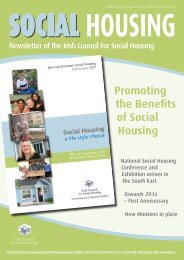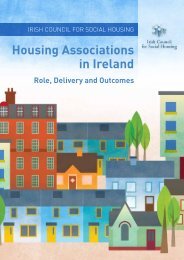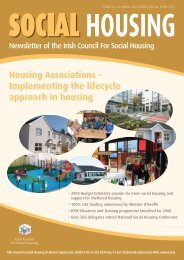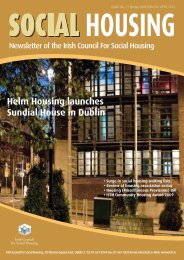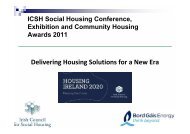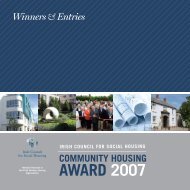National Housing Strategy for People with a Disability 2011 - 2016
National Housing Strategy for People with a Disability 2011 - 2016
National Housing Strategy for People with a Disability 2011 - 2016
Create successful ePaper yourself
Turn your PDF publications into a flip-book with our unique Google optimized e-Paper software.
(a) Assessment of Individual <strong>Housing</strong> Need9.27 A mental health disability is, in many respects, an unseen disability, insofar as thedisability cannot usually be visually recognised. <strong>People</strong> <strong>with</strong> mental health disabilities mayalso be less likely to disclose their disability due to concerns over confidentiality, stigma andlack of in<strong>for</strong>mation regarding the reasons <strong>for</strong>, and benefits of, disclosing medical history. Itcan also be extremely difficult to classify the nature and severity of a mental health disabilityand the consequent requirement <strong>for</strong> additional supports that such classification mightindicate.9.28 Applicants and their advocates, where appropriate, should be in<strong>for</strong>med that disability,including a mental health disability, is one of the grounds under which housing needs can beconsidered. Making the housing authority aware of a disability will mean that the authoritycan plan to meet the specific needs arising and to consider individual needs and additionalsupports required from other agencies in the allocation process. Disclosure of a disability,supported by medical evidence will allow an applicant to be considered <strong>for</strong> appropriateprioritisation 83 . As outlined in chapter 6, the new assessment of housing need processprovides a mechanism to determine the specific housing needs that may arise from the typeor nature of a person’s disability.9.29 There may be a perception that, as housing authorities have traditionally providedmainly family accommodation, they may be unable to meet the housing needs of people<strong>with</strong> a mental health disability, particularly single person households. In this context, theavailability of housing options such as long term leasing and RAS will assist in the provisionof a more diverse housing stock and in the achievement of mixed tenure sustainablecommunities, by providing accommodation outside of traditional local authority estates.This provides an increase in housing options suitable <strong>for</strong> people <strong>with</strong> a mental healthdisability. The role of disability and other voluntary organisations in promoting awareness ofthe assessment of need process is recognised. These organisations also have a role to playin increasing awareness of the availability of housing options <strong>for</strong> people <strong>with</strong> a mental healthdisability outside of traditional social housing.9.30 There has been some concern that some housing authorities might not alwaysconsider people <strong>with</strong> a mental health disability currently residing in HSE communityresidences, family homes or hospitals as a priority <strong>for</strong> housing as they might be perceived as83Applicants should also be made aware that prioritisation in this context does not necessarily mean thatsuitable housing will be available immediately.113



